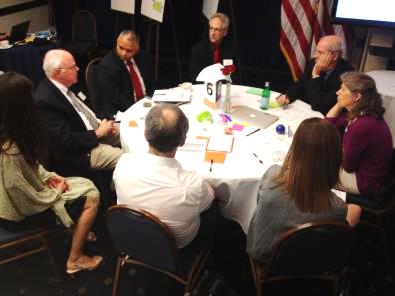Accelerating Evidence Generation for Governance Contributions to Health Outcomes
Categories: Announcements, Governance and Leadership, Health Systems Research, Presentations, Publications
Latest updates: Marshalling the Evidence for Governance Contributions to Health Outcomes
As donors and governments increasingly emphasize improved accountability and transparency of health systems, there is a significant need for sustained learning about what governance activities best contribute to health outcomes, such as lives saved and increased coverage of HIV/AIDS services. Demonstrating direct attribution of improved health system governance to specific and quantifiable health outcomes, however, is not an easy task.
On July 23, 2014, the USAID Health Finance and Governance (HFG) project hosted a one-day workshop at the National Press Club in Washington, D.C. on generating evidence of governance contributions to health outcomes. The event brought together almost 60 health and governance professionals from USAID, prominent external organizations such as the World Health Organization and the World Bank, and implementing partners to discuss the key evidence gaps and develop an action plan to address them. A comprehensive workshop report summarizing the key elements of the discussion and next steps was developed and shared with participants.
Leading industry experts, including Karen Cavanaugh, Director of the Office of Health Systems at USAID, and Dr. Sara Bennett, HFG’s Health Systems Research lead and an Associate Professor of Health Systems at the Johns Hopkins Bloomberg School of Public Health, kicked off the discussion, highlighting the role of governance in reducing maternal and child mortality rates and eradicating AIDS.
Participants then developed a prioritized list of evidence gaps and corresponding research questions for how governance contributes to health outcomes. The top-ranked gaps included:

Experts from USAID, WHO, the World Bank, and implementing partners gathered on July 23 to discuss evidence gaps and corresponding research questions for how governance contributes to health outcomes.
Photo: Caytie Decker (HFG).
- Fostering political will – what factors, incentives and motivations influence decision making of health sector leaders and effective coalitions for reform?
- Sustaining accountability mechanisms – how are country mechanisms for oversight and accountability institutionalized after external support ends?
- Prioritizing governance interventions – how can donors and countries determine which governance activities provide the greatest return to increase access to health services, improve health service quality and equity, and increase health system efficiency?
Workshop attendees also identified pragmatic opportunities to generate evidence within these priority areas. The most promising and immediate prospects focused on leveraging existing USAID evidence generation efforts, developing clear health governance metrics, fostering cross project collaboration, and mining existing evidence.
HFG’s Governance Advisor Jodi Charles stated that the success of the workshop was “a means to launch future closer collaboration with a group of people who work in health and also outside of the health sector” and to further advance evidence generation for the field of governance. The workshop also provided a foundation for continued discussions at the USAID Leadership, Management and Governance project Governance Roundtable in late September 2014, and the Third Health Systems Research Symposium in early October.
A full report, list of participants, and the slide presentations can be found below.
![]() Generating Evidence of Governance Contributions to Health Outcomes: Workshop Summary Report
Generating Evidence of Governance Contributions to Health Outcomes: Workshop Summary Report
![]() Introduction: “Health Governance: Building a Strategic Approach to Evidence”
Introduction: “Health Governance: Building a Strategic Approach to Evidence”



